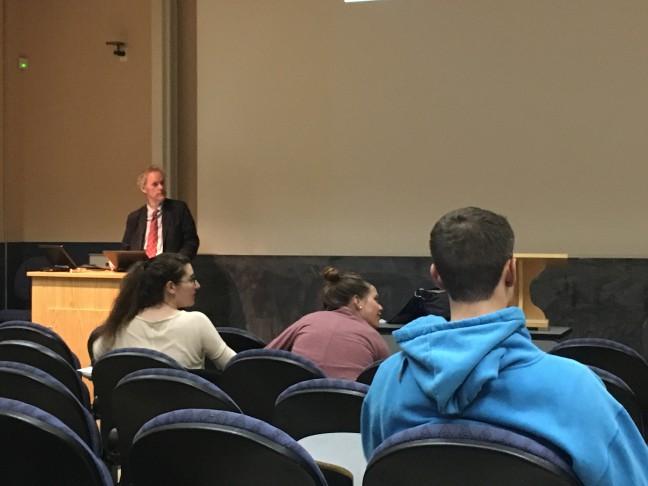More than three dozen students gathered in Ingraham Hall Tuesday night to hear Harry Brighouse, a University of Wisconsin philosophy professor, respond to Gov. Scott Walker’s assertion that professors should be teaching more classes.
Last summer during the state budget cuts, Brighouse was among many UW faculty who were displeased when Walker said universities could save more money if faculty taught more classes. Though Brighouse agreed that faculty members only teaching one or two classes a semester could teach more, he pushed against Walker’s claim since many professors already work 50 to 70 hours a week.
Brighouse said professors could use their time more productively while teaching students and researching. He said it is important to look at whether or not professors are using their time in the most productive ways possible for the state, the university and the public.
“I do not think most of us use our time in the most productive way for the students and for the public who between [the two] … pay most of our salaries,” Brighouse said.
Brighouse said tenured professors at elite institutions, like UW, are beneficiaries of an unfair system. He said these professors have relative affluence, unparalleled job security, freedom of thought and unparalleled control over their schedule and daily tasks.
While these elite universities and their professors are meant to be instruments of social closures, their students are constantly being exposed to an unusual amount of risks, he said.
Students from the ages of 18 to 24-years-old are exposed to multiple risks professors today do not fully appreciate, including a high rate of sexual assault and accumulating debt.
Students are the reason most professors have the privileges at these elite institutions in the first place, Brighouse said. That is why he said he argues professors should be doing more for the good of the public in the time they spend working. Two ways they can do this is through their research and teachings, he said.
While research that helps improve public health or understand what skills teachers should use to help students learn is useful, most of the research professors do is not.
“My conjecture is that much of the research that most of us do … is not very beneficial to the public,” Brighouse said. “The 1,500 [page] paper written on Hamlet this decade, that has taken hours and hours to do, I can’t believe is really helping the public.”
In addition, Brighouse said the current quality of teaching is “suboptimal.” Professors and graduate students learn how to teach by observing, mimicking what they observe, measuring how well it works and changing their styles based on feedback before “rinsing and repeating” the process again.
Brighouse said teaching is especially difficult because there is no true way to measure a professor’s teaching effectiveness.
“Teaching is more difficult than brain surgery,” Brighouse said. “A teacher has to see inside the heads [of students] without even cutting them open and make them learn.”
Some of the steps Brighouse said professors should take to help students learn more include consuming more research about how students learn, observing their colleagues and having their colleagues observe them.
Brighouse also said talking to students who give honest opinions of their professors is also helpful to best determine what they should change in their teaching styles as well.


